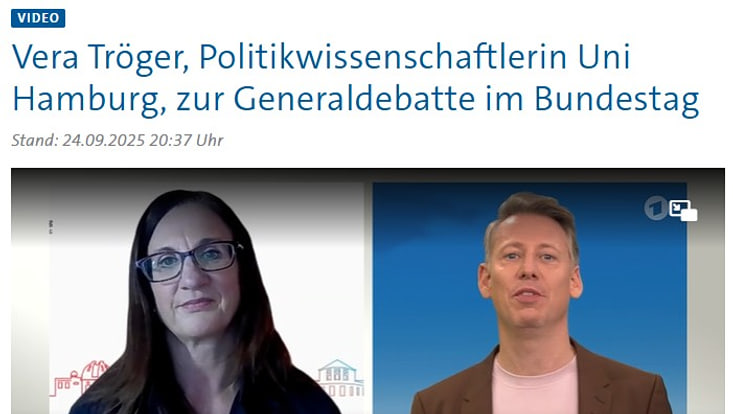Vera Troeger and Jessica Haak are presenting at the DVPW Convention 2024
24 September 2024
The 29th Academic Convention of the German Political Science Association (DVPW) takes place on September 24 – 27, 2024 at the Georg-August-Universität in Göttingen. The Convetion Theme of this years convention is "Politics in times of Polycrisis".
In the panel "Women in Parliament: Explanations and Effects", Vera Troeger and Jessica Haak are presenting their papers. In the panel "Political Mobilization of Women", Vera Troeger is serving as discussant.
Vera Troeger is presenting her paper with the title "Gendered Policy Making? Access of female MPs to legislative committees in German State Legislatures" (Co-authored by Verena Fetscher).
Abstract: Much work has been done on the gender composition of parliaments but less is know about access and position of female MPs to/in parliamentary committees. These committees exert important policy-making powers in many parliamentary democracies. We show that access to committees is gendered, and women are less likely to become members and chairs of more important committees such as finance or economics. We argue that this gendered access is not merely explainable by factors such as competence, expertise and experience but also due to potential self-selection and discrimination. We propose theoretical and empirical ways to distinguish the two. We test our arguments with unique individual level data on MPs of the German Bundestag and state parliaments since 1948. Our results show that there is gender bias in access and composition of legislative committees that is somewhat mitigated by experience and expertise of MPs. Our results help linking aspects of descriptive representation of women and their ability to influence policy-decisions.
Jessica Haak is presenting her paper "The Gender Gap in Political Science Publications: Evidence from the Journal of Politics" (Co-authored by Vera Troeger and Ilayda Yücel).
Abstract: Female scholars publish less often in top peer-reviewed (political science) journals than men. An established body of literature argues that the gender gap in publication is due to women submitting their work less often for various reasons. Yet, the editorial process could be a conceivable source for the gap. While most studies addressing publication bias typically analyse the research output, we collect unique data from the submission, peer review, and decision-making stages of the Journal of Politics (JOP). Our data covers over 5,900 authors and submissions received between 2021 and 2023. Descriptive analysis and linear probability models show that the gender gap emerges early in the publication process. While there is a difference in submission rates, examining various stages in the journal’s editorial process does not indicate gender discrimination.

